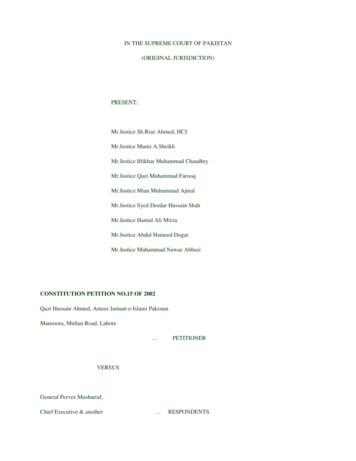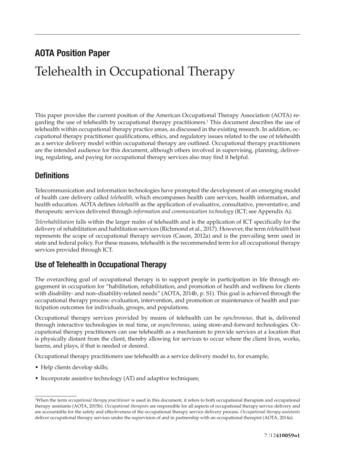Occupational Justice And Social Occupational Therapy . - NearlyFreeSpeech
Occupational Justice andSocial Occupational Therapy: mappingthe discussion about social issues andbuilding international dialoguesAna Malfitano, PhDLilian Magalhães, PhDElizabeth Townsend, PhD
Why connect internationally?-Social issues are interrelated, despite local contexts-Knowledge production and solidarity-A research project is underway, for which the mainquestion is:What are the current discussions about socialissues in occupational science andoccupational therapy around the world?
Brazil and Canada:similarities that create opportunities to talkabout social issues
Who are the potential internationalcollaborators?How can we find and connect them?-Brazilian policies have been encouraginginternational partnerships “Science without borders”-Visiting PhD candidates-Research collaboration-Post-doctoral fellows
SOCIAL ISSUES AND OCCUPATIONALTHERAPY: MAPPING THE DISCUSSION ANDBUILDING INTERNATIONAL DIALOGUESFUNDED BYCNPQ BRAZIL, 2013
Project overview:This project is framed as a dialogical encounter,informed by Paulo Freire’s legacy ofcritical reflexivity.It is also inspired by the proposition of knowledge forsolidarity, according to Souza Santos (2014):“Solidarity as a form of knowledge is the recognition ofthe other both as an equal, whenever difference makesher or him inferior, and as a different, wheneverequality jeopardizes his or her identity.” (p. 156)
It has been divided in threesubprojects:I) Scoping review of the literature on theproduction of occupational therapy andoccupational science related to socialissues in Portuguese and English.
II) Interviews with researchers identifiednationally and internationally will beperformed, compiling their narratives abouttheir production in the field, the theoreticalfoundations adopted and future challenges.III) Working groups will be developed in order tointegrate the previous two subprojects andfoster an expanded discussion in the formatof a scientific event.
Social Occupational TherapyIn Brazil, social occupational therapy aims to worktoward social inclusion of individuals and groupswho experience persistent social, cultural, andeconomic disadvantage (Barros, Ghirardi, Lopes,2005).
Social Occupational TherapyThe claim for social occupational therapy is that apolitically and ethically framed perspective is essentialfor researchers to understand contemporary socialissues such as living conditions, inclusiveentitlements, and social and occupational rights.(Malfitano, Lopes, Magalhães & Townsend, 2014) .
Literature review of Anglophonematerial: preliminary dataDatabases: Scopus, Web of Science and CinahlKeywords: “occupational justice”,“occupational injustice”, “occupationalapartheid”, “occupational rights” andoccupational therapyUp to 2013, 88 peer reviewed texts were found
Preliminary findingsOccupational justice: authors emphasizecontext and social injustice exploringoccupational possibilities, specially fromhealth system practices.Different population groups: elders, people withdisabilities, people with mental healthdisorders, first nations, homeless and othervulnerable groups.Meaning and choice are prevalent topics
The language choicesOccupational Justice:- Social Justice/injustice- Context- Occupation/Meaning- Cappability
Brazilian literature Source: Brazilian Journals of OccupationalTherapy (2) Title, abstract and keywords were explored toidentify the field of social occupationaltherapy Up to 2010, 25 peer reviewed texts werefound 10 Intervention Reports, 8 TheoreticalArticles, 6 Research Articles and 1 LiteratureReview.
The language choicesPreliminary findings in Social OccupationalTherapy- Territory/Place- Social Technology/Models of Intervention- Collective Activities- Citizenship and Social and civil Rights
Common threads within the literatureSocial Occupational Therapy &Occupational Justice:- Participation- Rights (human, civil and social rights)- Critical approach- Connections between the collectivedimension and the individual needs
What are the benefits ofinternational collaboration?Try to contribute with an importantongoing international dialogue, suchas the ISOS Discussion Forumregarding 'Critical' OccupationalScienceHow can occupational science moveforward in its development as asocially and politically engageddiscipline?
What are the barriers andchallenges for internationalcollaboration?“Occupation” (as an expression and as a concept) it is notwell accepted in Brazil (Magalhaes & Galheigo, 2010): theissue of “translational contact zone” (Souza Santos,2014)Much attention has been given to the contexts of eachcountry and its specificities, preventing internationalanalysesAn international research agenda may be helpful to fosterthe dialogue between OT and OS and within OS
Research Agenda:Can occupation-basedpractical andconceptualtechnologies promoteemancipatory actionsin the social field?
ReferencesBarros, DD, Ghirardi, MI, Lopes, RE (2005). Social occupational therapy: a socio-historicalperspective. In F. Kronenberg, S. S. Algado & N. Pollard (Eds.), Occupational therapy without borders:Learning from the spirit of survivors (pp. 140-165). Toronto, ON: Elsevier Churchill Livingstone.Freire, P. (1970). Pedagogy of the oppressed. New York, NY: Continuum.Galheigo, S. M. (2014). Sobre identidades, latinoamericanidades e construção de saberes emterapia ocupacional: Identities, Latin American matters and knowledge production in occupationaltherapy: Dialogues with Boaventura de Sousa Santos. Cadernos De Terapia Ocupacional DaUFSCar, 22(1), 215-221.Malfitano, A.P.S.; Lopes, R.; Magalhaes, L.; Townsend, E. Social occupational therapy:conversations about a Brazilian experience, Canadian Journal of Occupational Therapy, v. 81, n. 4,ahead of print, 2014. DOI: 10.1177/0008417414536712Magalhães, L., & Galheigo, S. (2010). Enabling international communication among Brazilianoccupational therapists: Seeking consensus on occupational terminology. , 17(3), 113-124.DOI: 10.1002/oti.292.Santos, B. S. (2014). Epistemologies of the South–Justice against Epistemicide. ParadigmPublishers, LondonTownsend E & Wilcock A. (2004). Occupational justice and client-centered practice: A dialogue inprogress. Canadian Journal of Occupational Therapy, 71 (2): 75-87.Wilcock A & Townsend E. (2000). Occupational terminology interactive dialogue. Journal ofOccupational Science, 7(2): 84-86Images: Os gêmeos. Available at: http://www.osgemeos.com.br/en
Santos, B. S. (2014). Epistemologies of the South-Justice against Epistemicide. Paradigm Publishers, London Townsend E & Wilcock A. (2004). Occupational justice and client-centered practice: A dialogue in progress. Canadian Journal of Occupational Therapy, 71 (2): 75-87. Wilcock A & Townsend E. (2000). Occupational terminology interactive .
Mr.Justice Sh.Riaz Ahmed, HCJ Mr.Justice Munir A.Sheikh Mr.Justice Iftikhar Muhammad Chaudhry Mr.Justice Qazi Muhammad Farooq Mr.Justice Mian Muhammad Ajmal Mr.Justice Syed Deedar Hussain Shah Mr.Justice Hamid Ali Mirza Mr.Justice Abdul Hameed Dogar Mr.Justice Muhammad Nawaz Abbasi CONSTITUTION PETITION NO.15 OF 2002
Criminal Justice Information Project Catherine Plummer, SEARCH Pamela Scanlon, Automated Regional Justice Information System Laurie Smith, Kalamazoo Criminal Justice Council Integrated Justice Information System Institute (Integrated Justice Information Systems): Susan Bates, Justice Management Inc. Steve Mednick, Law Offices of Steven G.
Justice David S. Wiggins Justice Daryl L. Hecht Justice Brent R. Appel Justice Thomas D. Waterman Justice Edward M. Mansfield Justice Bruce B. Zager In Memoriam Chief Justice W. Ward Reynoldson (Iowa Supreme Court 1971-1987) Justice James H. Carter (Iowa Supreme Court 1982-2006)
Community School students: (l-r) Justice William J. Crain, Justice Piper D. Griffin, Chief Justice John L. Weimer, Justice Jay B. McCallum, and Justice James T. Genovese. (l-r) Louisiana Supreme Court Justice William J. Crain, Chief Justice John L. Weimer(seated), and Law Library of . Louisiana Director Miriam Childs.
Documentation of occupational therapy services is necessary whenever professional services are provided to a client. Occupational therapists and occupational therapy assistants1 determine the appropriate type of documentation structure and then record the services provided within their scope of practice. This document, based on the Occupational .File Size: 540KBPage Count: 9Explore furtherDocumentation & Reimbursement - AOTAwww.aota.orgNEW OT Evaluation and Reevaluation - AOTA Guidelinestherapylog.typepad.comWriting progress notes in occupational therapy jobs .www.aureusmedical.comDocumentation & Data Collection For Pediatric Occupational .www.toolstogrowot.comSOAP Note and Documentation Templates & Examples Seniors .seniorsflourish.comRecommended to you b
1When the term occupational therapy practitioner is used in this document, it refers to both occupational therapists and occupational therapy assistants (AOTA, 2015b). Occupational therapists are responsible for all aspects of occupational therapy service delivery and are accountable for the safety and effectiveness of the occupational therapy .
Occupational therapists around the world are obligated to promote occupational rights as the actualization of human rights. This obligation requires addressing occupational injustices, initially named as occupational deprivation, occupational imbalance, occupational marginalisation, and occupational alienation (Wilcock & Townsend, 2000 .
Conditional Random Fields: An Introduction Hanna M. Wallach February 24, 2004 1 Labeling Sequential Data The task of assigning label sequences to a set of observation sequences arises in many fields, including bioinformatics, computational linguistics and speech recognition [6, 9, 12]. For example, consider the natural language processing























